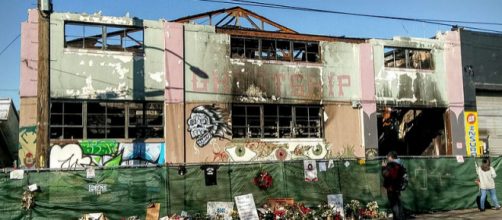This week's Alameda County Superior Court decision refusing to dismiss the city of Oakland from a damage lawsuit filed by families of Ghost Ship fire victims is good news for the aggrieved plaintiffs -- and for the rest of us as well.
For the plaintiffs, it means that there will be a sure source of money to pay damages if the city is found liable, as seems likely, for failing to inspect or exert any control over an illegal multiple-occupancy living space desperately in need of adult supervision. It's unclear whether any of the other defendants, except Alameda County, has enough money to pay what promises to be a hefty verdict.
But for the rest of us, we who pay the taxes that fund Alameda County and Oakland, it means that two of California's largest oldest bureaucracies could be forced to reveal how their behind-the-scenes decisions are made. If the ruling stands, kind of a big "if" since it will almost certainly be appealed many times by many attorneys, thousands of businesses and bureaucrats up and down the Golden State who benefit from those decisions will likely be very unhappy.
What's going on
Behind-the-scenes bureaucrats decide nearly everything in our complex structure of overlapping jurisdictions, such as who gets to build what where, who gets charged with what in criminal court and, like in the Ghost Ship case, who gets to open individual businesses.
In a city as large as Oakland, there could be hundreds of people working basically anonymously keeping tabs on everything.
The sorry case of the Ghost Ship has brought the behind-the-scenes bureaucrats to the forefront. Someone or someones allowed an illegal live/work warehouse to operate in Oakland's Fruitvale district, someone or someones gave the property owner permission to rent out the building even though it hadn't been inspected in 30 years, and someone or someones allowed this property owner to accumulate more than a dozen properties in Oakland even though most of those properties were in derelict condition.
If the lawsuit against Oakland and Alameda County is allowed to proceed, the public stands to find out who these people are and, probably, how to best ensure that such a tragedy never happens again.
Alameda County has also been named as a defendant in the families' lawsuit but also claims to be immune from suit and has moved for dismissal.
Of course, Oakland could have avoided the precarious legal situation by being forthcoming in the days and weeks following the tragedy and working alongside the public in investigating what went wrong. Instead, the city has tried to keep information about the tragedy -- information owned by the public -- from being released.
City officials had to be sued by area newspapers before they would release details about contacts between police, firefighters and residents of the Ghost Ship, ordered debris from the fire removed and dumped in bay wetlands without permits, and then announced that criminal charges would only be brought against two Ghost Ship residents even though the investigation still seemed to be progressing.
Finding out
t's a shame that Oakland bureaucrats have so little loyalty to the citizens who pay them that people who lost children in the fire had to sue to find out the truth about what happened and to get justice. Of course, it wasn't the bureaucrats who invited dozens of people to fill the Ghost Ship on the night of the fire for an unapproved musical performance, nor was it the bureaucrats who failed to install sprinklers and fire alarms that could have saved many of the lives that were lost.
City bureaucrats are not responsible for soaring rents that force people to live in overcrowded and substandard housing. But it is the job of the bureaucrats to try to keep residents safe by enforcing safety codes and other city rules.
Oakland has building inspectors and probably pays them handsomely and houses them in expensive offices in beautiful downtown towers. So, what happened with the Ghost Ship?


